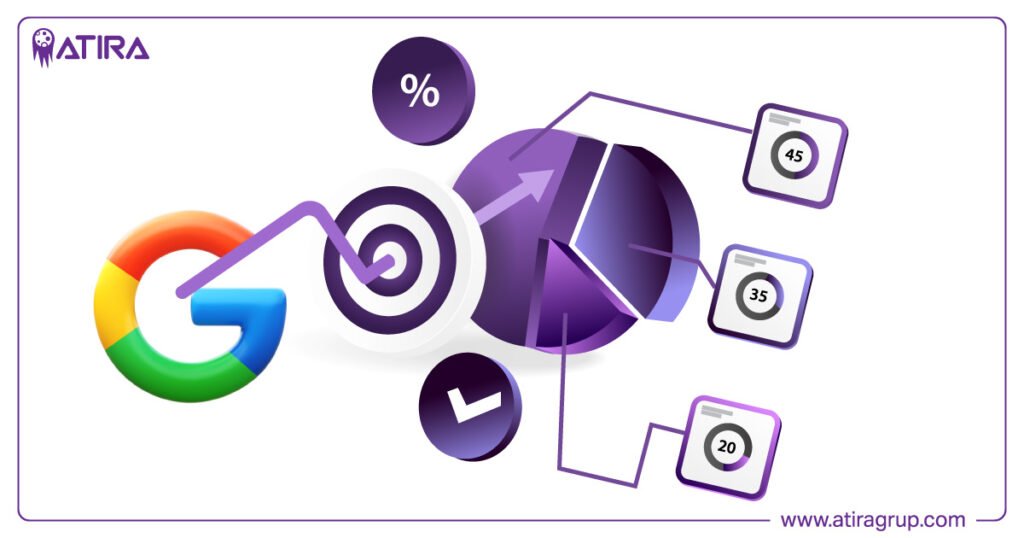In the world of digital marketing, Search Engine Optimization (SEO) is a critical component for driving organic search traffic and improving a website’s visibility on search engines.
Traditionally, keyword rankings have been the go-to metric for measuring SEO success. However, with search engines’ ever-evolving landscape and the complexities of user behavior, it’s essential to look beyond keyword rankings to get a comprehensive view of SEO performance.
Table of Contents
In this article, we’ll explore various ways to measure SEO success beyond keyword rankings, using a range of SEO metrics and tools like Google Analytics and Google Search Console.
The Limitations of Keyword Rankings
Why Keyword Rankings Aren’t Enough
Keyword rankings have long been a fundamental metric in assessing SEO success. They provide insights into how well a website performs for specific keyword phrases on search engine results pages (SERPs). However, focusing solely on keyword rankings can be misleading for several reasons:
- Fluctuations in Rankings: Keyword rankings can fluctuate frequently due to various factors, such as algorithm updates, changes in search intent, and increased competition. These fluctuations can make it challenging to gauge long-term SEO success based solely on rankings.
- Personalized Search Results: Search engines like Google personalize search results based on the user’s location, search history, and device. This means the same keyword may produce different user rankings, making relying solely on keyword ranking data difficult.
- SERP Features: Search engine results pages now include various SERP features, such as featured snippets, local packs, and knowledge panels, which can impact organic traffic regardless of keyword rankings. For instance, a site may rank highly but receive fewer clicks due to the presence of a featured snippet or an ad.
- Focus on Vanity Metrics: Keyword rankings can sometimes lead to overemphasizing vanity metrics that look good on paper but don’t necessarily contribute to business goals like conversions or revenue.
Given these limitations, measuring SEO success using a broader set of metrics that provide a more holistic view of a website’s performance is crucial.
Key Metrics for Measuring SEO Success Beyond Keyword Rankings

1. Organic Search Traffic
Organic search traffic refers to the visitors who arrive at your website through unpaid search engine results. It’s one of the most essential SEO metrics because it directly reflects the effectiveness of your SEO efforts in attracting visitors.
- How to Measure: Use Google Analytics to track the number of sessions, users, and page views generated from organic search. This data helps you understand the traffic volume your SEO strategy is driving to your website.
- Why It Matters: Increasing traffic from organic search is a strong indicator of SEO success. More traffic typically means more people find your website through search engines, which can lead to higher engagement and conversions.
2. Conversion Rate from Organic Traffic
While driving traffic to your website is essential, measuring how well that traffic is converting into paying customers, leads, or other desired actions is equally important.
- How to Measure: Set up conversion tracking in Google Analytics to monitor users’ actions on your website, such as filling out a form, making a purchase, or signing up for a newsletter. Analyze the conversion rate specifically for organic search traffic.
- Why It Matters: A high conversion rate from organic traffic indicates that the visitors arriving at your site are highly relevant and that your SEO efforts are attracting the right audience. This metric ties SEO success directly to business outcomes.
3. Bounce Rate and Average Session Duration
Bounce rate measures the percentage of visitors who leave your website after viewing only one page. At the same time, average session duration indicates the average time visitors spend on your site.
- How to Measure: Both bounce rate and average session duration can be tracked in Google Analytics under the “Behavior” section. These metrics can be analyzed specifically for organic traffic.
- Why It Matters: A high bounce rate or low average session duration may suggest that visitors aren’t finding what they’re looking for, which could indicate issues with content relevance, page speed, or user experience. Improving these metrics can enhance SEO performance by increasing user engagement.
4. Click-Through Rate (CTR) on SERPs
Clickthrough rate CTR measures the percentage of users who click on your website’s link after seeing it on the search engine results page (SERP).
- How to Measure: Use Google Search Console to track CTR for specific keywords and pages. This tool provides insights into how often your website appears in search results and how frequently users click through to your site.
- Why It Matters: A high CTR indicates that your meta descriptions, title tags, and other elements of your search snippets are compelling and relevant to searchers. Improving CTR can lead to more traffic without necessarily improving keyword rankings.
5. SERP Visibility and Share of Voice
SERP visibility refers to your website’s prominence on the search engine results page, while the share of voice measures your website’s visibility relative to competitors for specific keywords.
- How to Measure: Tools like SEMrush, Ahrefs, and Moz provide insights into SERP visibility and share of voice by tracking your website’s ranking positions and comparing them to competitors.
- Why It Matters: High SERP visibility and a strong share of voice indicate that your website consistently appears in search results for relevant keywords, which can lead to increased brand awareness and traffic over time.

6. Technical SEO Metrics
Technical SEO metrics focus on the backend aspects of your website that affect its performance in search engines, such as page speed, mobile-friendliness, and crawlability.
- How to Measure: Conduct a site audit using tools like Google PageSpeed Insights, GTmetrix, or Screaming Frog to identify technical issues affecting your website’s performance. Google Search Console also provides insights into mobile usability and crawl errors.
- Why It Matters: Technical SEO issues can hinder your website’s ability to rank well in search engines, regardless of content quality or keyword optimization. Addressing these issues can improve user experience and SEO performance.
7. Backlink Profile and Referring Domains
Backlinks are links from other websites that point to your site, and referring domains are the unique websites that provide those backlinks. A strong backlink profile is crucial for SEO success.
- How to Measure: Use tools like Ahrefs, Moz, or Majestic to analyze your backlink profile and track the number of referring domains. Look for high-quality backlinks from authoritative sites.
- Why It Matters: A diverse and authoritative backlink profile signals to search engines that your website is credible and trustworthy, which can improve your rankings and overall SEO performance.
8. Indexed Pages and Crawl Errors
Indexed pages refer to the pages on your website that have been crawled and indexed by search engines, while crawl errors occur when search engines encounter issues accessing your pages.
- How to Measure: Google Search Console provides data on the number of indexed pages and any crawl errors that need to be addressed.
- Why It Matters: Ensuring that all relevant pages are indexed and free of crawl errors is essential for maximizing your website’s visibility in search results. Addressing crawl errors can prevent issues that might negatively impact SEO performance.
9. User Engagement Metrics
User engagement metrics such as average time on page, pages per session, and top exit pages provide insights into how users interact with your website.
- How to Measure: Google Analytics tracks user engagement metrics, allowing you to analyze how visitors navigate your site and which pages they find most engaging.
- Why It Matters: High levels of user engagement suggest that your content is valuable and relevant to your audience. Improving engagement metrics can lead to better SEO performance and higher conversion rates.
10. Content Performance and Search Intent
Understanding how well your content aligns with search intent and how it performs regarding engagement and conversions is crucial for SEO success.
- How to Measure: Analyze content performance in Google Analytics by reviewing metrics such as page views, average time on page, and goal completions. Tools like SEMrush can help identify search intent by analyzing keyword phrases and SERP features.
- Why It Matters: Content that aligns with search intent and performs well in engagement and conversions is more likely to rank highly in search engines. Continuously refining your content strategy based on these insights can improve SEO effectiveness.
11. Conversion Tracking and Revenue Attribution
Ultimately, the success of your SEO efforts should be measured by how well they contribute to your business’s bottom line. Conversion tracking and revenue attribution are essential metrics for this purpose.
- How to Measure: Set up conversion tracking in Google Analytics and use attribution models to determine how organic traffic contributes to conversions and revenue. This can include tracking e-commerce transactions, lead generation, or other key performance indicators (KPIs).
- Why It Matters: Measuring the financial impact of your SEO efforts allows you to demonstrate ROI and make data-driven decisions about your SEO strategy. It also helps identify which aspects of your SEO efforts are driving the most value.
Tools for Measuring SEO Success Beyond Keyword Rankings
1. Google Analytics
Google Analytics is a powerful tool for tracking a wide range of SEO metrics, including organic search traffic, conversion rates, user engagement, and more. You can gain a comprehensive view of your SEO performance by setting up custom reports and dashboards.

2. Google Search Console
Google Search Console provides valuable insights into how your website is performing in Google search results. It tracks keyword rankings, CTR, indexed pages, and crawl errors, making it an essential tool for monitoring SEO success.
3. Ahrefs and SEMrush
SEMrush and Ahrefs are comprehensive SEO tools that offer detailed reports on keyword rankings, backlink profiles, SERP visibility, and competitive analysis. These tools are invaluable for tracking SEO progress and identifying opportunities for improvement.
4. Moz
Moz offers a range of SEO tools, including keyword research, site audits, and link-building analysis. Moz’s Domain Authority (DA) metric is handy for assessing the overall strength of your website’s backlink profile.
5. Screaming Frog
Screaming Frog is a website crawler that helps identify technical SEO issues, such as broken links, duplicate content, and crawl errors. It’s an essential tool for conducting site audits and improving technical SEO.

Conclusion: Measuring SEO Success with a Holistic Approach
While keyword rankings remain an essential aspect of SEO, they are just one piece of the puzzle. To truly measure SEO success, a holistic approach that considers a wide range of metrics, including organic search traffic, conversion rates, user engagement, technical SEO, and more, is necessary.
Leveraging tools like Google Analytics, Google Search Console, and specialized SEO platforms can help you understand your website’s performance and the effectiveness of your SEO strategy.
This data-driven approach allows you to make informed decisions, optimize your efforts, and achieve tremendous success in search engine optimization.
Remember, SEO is not just about increasing traffic or improving rankings—it’s about driving meaningful results that align with your business goals. By focusing on the right metrics and continuously refining your strategy, you can ensure that your SEO efforts deliver long-term value and contribute to your business’s growth.
Also read:
Link Building: Unique Guide to Boost Your SEO
Keywords Match Types on Google Ads
FAQs
1. Why is it important to measure SEO success beyond keyword rankings?
Keyword rankings provide valuable insights into your website’s performance for specific keywords on search engine results pages (SERPs). However, relying solely on keyword rankings can be misleading due to fluctuations, personalized search results, and the presence of SERP features. Measuring SEO success beyond keyword rankings offers a more comprehensive view of your website’s performance, including organic search traffic, user engagement, conversions, and overall business impact.
2. What are the most important metrics to track for SEO success?
Some of the most important metrics to track for SEO success include:
– Organic search traffic
– Conversion rate from organic traffic
– Bounce rate and average session duration
– Click-through rate (CTR) on SERPs
– SERP visibility and share of voice
– Technical SEO metrics such as page speed and mobile-friendliness
– Backlink profile and referring domains
– Indexed pages and crawled errors
– User engagement metrics like average time on page and pages per session
– Content performance and search intent alignment
– Conversion tracking and revenue attribution
3. How does organic search traffic reflect SEO success?
Organic search traffic refers to the visitors who arrive at your website through unpaid search engine results. An increase in organic search traffic indicates that your SEO efforts successfully drive more visitors to your site. This metric is crucial because it directly reflects how well users find your website through search engines, which can lead to higher engagement and conversions.
4. What tools can I use to measure SEO performance?
Several tools can help you measure SEO performance, including:
– Google Analytics: Tracks a wide range of metrics, including organic search traffic, conversion rates, user engagement, and more.
– Google Search Console: Provides insights into keyword rankings, CTR, indexed pages, and crawl errors.
– SEMrush and Ahrefs: Offer detailed reports on keyword rankings, backlink profiles, SERP visibility, and competitive analysis.
– Moz: Provides tools for keyword research, site audits, and link-building analysis.
– Screaming Frog: A website crawler that identifies technical SEO issues such as broken links, duplicate content, and crawl errors.
5. Why is the conversion rate from organic traffic an important metric?
The conversion rate from organic traffic measures how well your website’s organic visitors convert into leads, sales, or other desired actions. A high conversion rate indicates that your SEO efforts attract the right audience—those more likely to engage with your content or purchase. This metric ties SEO success directly to business outcomes, making it a crucial indicator of the effectiveness of your SEO strategy.
6. What role does technical SEO play in overall SEO success?
Technical SEO focuses on the backend aspects of your website that affect its performance in search engines, such as page speed, mobile-friendliness, crawlability, and site architecture. Addressing technical SEO issues ensures that search engines can effectively crawl, index, and rank your site. Technical SEO also impacts user experience, influencing metrics like bounce rate, session duration, and rankings.
7. How does user engagement impact SEO performance?
User engagement metrics, such as average time on page, pages per session, and bounce rate, provide insights into how visitors interact with your website. High levels of user engagement suggest that your content is valuable and relevant to your audience, which can positively impact SEO performance. Search engines may interpret strong engagement signals as indicators of quality content, which can lead to higher rankings and more traffic.
8. What is SERP visibility, and why is it important?
SERP visibility refers to how prominently your website appears on search engine results pages. It’s important because higher visibility on SERPs increases the likelihood of users clicking on your website’s link. Strong SERP visibility also contributes to brand awareness and can lead to more organic traffic over time.
9. How can I track and improve my website’s click-through rate (CTR)?
Click-through rate (CTR) measures the percentage of users who click on your website’s link after seeing it in the search results. To track CTR, use Google Search Console, which provides data on how often your site appears in search results and how frequently users click through to your site. To improve CTR, optimize your meta descriptions, title tags, and URL structures to make them more compelling and relevant to searchers’ intent.
10. How do backlinks and referring domains influence SEO success?
Backlinks from authoritative websites signal to search engines that your content is trustworthy and valuable, which can boost your rankings. The number and quality of referring domains (unique websites linking to your site) are crucial factors in building a solid backlink profile. A diverse and high-quality backlink profile enhances your website’s credibility, leading to better SEO performance.


